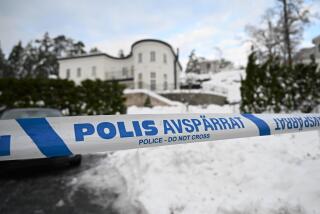Fig Leaf?
- Share via
Ten days ago General Secretary Mikhail S. Gorbachev’s great challenge as the leader of the Soviet Union was getting his sagging economy under control. Now it is getting his secret police under control before they burn the few small bridges that have been built between East and West since last year’s summit meeting. Unless it was the general secretary himself who ordered the torches put to those bridges.
In a private letter delivered over the weekend, President Reagan assured Gorbachev that Nicholas Daniloff, a 52-year-old American journalist who was arrested by the KGB on Aug. 30 is no spy. The only known answer was a formal charge of espionage--filed Monday against Daniloff, who remains in a small cell in a KGB prison in Moscow.
With the charge also came a return to the sullen language of xenophobia that had been missing from Soviet conversation in recent weeks, as in a Moscow television commentator’s complaint that the Americans, if you can believe it, are “making (Daniloff) into a pawn in a political game of chess.”
The Kremlin even insinuated that Daniloff’s fellow Moscow correspondents knew that he was up to something. The newspaper Izvestia said that at the mention of his name “many of his colleagues in Moscow would make an unpleasant grimace, ‘Oh, that one,’ and they would behave as if they were given to understand they should have nothing to do with this man.” According to Moscow correspondents who knew him, any grimaces resulted from his being so thoroughly familiar with the language and the Soviet people that he was a formidable competitor at his craft.
Whatever else results from the formal accusation of espionage, it will reinforce in the West a sense that Gorbachev’s “new leaf” of recent months is a fig leaf covering a system that has not changed anything except its choice of words, one that continues to place the whims of the state ahead of the rights of individuals.
For some days both governments encouraged an impression that Daniloff would be out in no time under a political agreement involving Gennady F. Zakharov, a Soviet agent attached to the United Nations, who was arrested in New York recently. Unidentified Washington officials noted that the handling of the Zakharov arrest was outside the rules of the “game” that the KGB and the FBI and the CIA play behind the scenes. The impression was fostered by nimble distinctions in Moscow between official and unofficial comment on possible deals.
A deal seemed less likely Monday. It is rare for a President to put himself on the line by vouching for anyone in the circumstances in which Daniloff found himself 10 days ago--surrounded by eight KGB agents, a sealed envelope in his hands that he had just accepted from an acquaintance of five years. It is not surprising that Reagan issued a tough statement following the filing of formal charges that there would be no trade and calling on the Soviets to let Daniloff go before his arrest creates new obstacles to U.S.-Soviet relations.
Daniloff’s treatment does not make confrontation between the United States and the Soviet Union any more attractive or attempts to limit the arms race with an agreement in Geneva any less urgent. It just makes the one harder to avoid and the other harder to achieve. As of now, the only person in the world with the power to put the Daniloff affair right is Gorbachev. That he might refuse makes the immediate future of superpower relations look bleak. That he might lack the power to make his secret police back off makes that future look positively dark.
More to Read
Sign up for Essential California
The most important California stories and recommendations in your inbox every morning.
You may occasionally receive promotional content from the Los Angeles Times.













